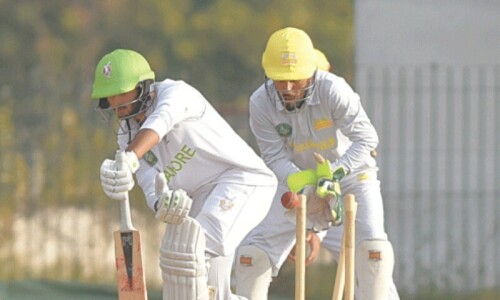ON the Dadu plain, where a proud village of Chandios once stood, there are now only ashes. It has been five days since the Faiz Muhammad Duryani village witnessed the fury of hell fire, but the embers of that evil blaze were still smouldering on Friday.
Until a few days ago, this charred landscape housed the homes of the Chandio brothers: Imamuddin, Ikramuddin, Sobdar, Zaib, Dhani Bux and Bahar Khan.
This extended family lost seven members that fateful night, and most of them are still traumatised by visions of children being burned alive in front of their very eyes.
Sabul, the wife of their cousin Rustam Chandio, still regrets not being able to save her daughter, Tahmeeza. When the alarm was sounded, she leapt to her feet, her maternal instinct pushing her first towards her youngest girl, Reehana.
After getting her to safety, Sabul tried to go back for the other girl, but by this time, the dry thatch roof of their dwelling had gone up like a keg of gunpowder and there was an impenetrable wall of flames between her and Tahmeeza.
“She was crying out to me to save her, but I had become helpless; I was not able to enter the house and I watched my daughter burn before my eyes.”
Thankfully, her four other children made it out alive.
It is evident that Sabul is not up to re-living the trauma, and breaks down in tears as she recalls how, the next day, she had to pick up her daughter’s smouldering body. Her husband doused it with water to stop the smoke rising from it.
The smell and sensation of burnt flesh, your own flesh and blood, is not something one should have to encounter in their own lifetime.
Rustam recalls that when the flames started to spread, he ran out of the house and started calling out to his relatives to protect their children and family members who were inside the thatched huts which were engulfed in flames in a matter of seconds.
The brothers’ homes, which were located in a row, caught fire in quick succession as the flames spread. Rustam says he repeatedly contacted town committee officials in Mehar and district administration officials from Dadu and begged them to send help.
In response, he was told that the fire engines did not have enough fuel to make the journey. The fire broke out on Monday night, but help did not arrive until Tuesday morning.
Rustam’s cousin, Imamuddin, collected the ashes of four children with his own hands; from his oldest, 16-year-old Moor to four-year-old Nirgis.
“I was alone and stranded since the fire had encircled the entire house.”
He says that he managed to rescue two infant nephews, Juman and Hussain, and bring them to safety. But when he tried to run back through the flames to fetch his own children, his path was blocked.
He too was continuously pleading with officers of the district administration and municipal committee to send ambulances and fire tenders, but help did not come in time.
Losing livestock, and with it all hope
For the residents of this subsistence community, the pain of losing a child is nearly eclipsed by the inevitable starvation, brought on by the deaths of their livestock.
Sabul Chandio related how her household lost nearly half a dozen cows, 12 goats and two buffaloes in the blaze, apart from all their valuables and land and identity documents. Their life savings, the grain they had stored in the hopes of selling for a profit; all gone in the blaze.
One of her relatives narrated how the flames first reached the animal portion located to the west of their makeshift dwelling. Dozens of heads of cattle, who were tethered in their enclosures, were the first to succumb — their cries audible across the plain.
Remember, the Chandios of Faiz Muhammad Duryani are tied to the land: they live off the soil and what it yields and so do their animals. With Eidul Fitr approaching, many families here had tied their hopes for new clothes and gifts to the sale of these animals or their produce on the open market.
But instead of celebrating the occasion with their loved ones, the families who live here will remain in mourning through the ‘festive season’.
Although they claim that they have little left to live for, the conditions of these residents of Mehar are dire. They are camped out in makeshift tent houses close to the dwellings of their relatives who live nearby. They are forced to stay in the open, and the oppressive Sindh sun takes no prisoners either.
The government, for its part, has distributed tents and ration bags to the affected families. Each survivor of the fire has been provided with a bed and blanket each. Edhi has set up a camp and the Saylani Trust is also active in the area. The Sindh government and even the Pakistan Army are on hand to provide relief and even the prime minister has also promised Rs10 million in support.
But the residents of the village insist that they are not beggars and do not require handouts. “We want to rebuild our homes, our lives,” they say. The compensation they have been promised — Rs500,000 for each of the deceased and Rs200,000 for each injured person — is insufficient for that purpose.
Sindh Chief Minister Murad Ali Shah also announced reconstruction of the gutted homes of the community after a proper survey and cheques have been distributed among them.
For them, the loss of loved ones is being overshadowed by the prospect of starvation after losing their primary source of income; their grain and their livestock, and their top priority is to be granted some semblance of support for their livelihood. Otherwise, they fear, when the cameras stop rolling, their lifelines will run out as well.
Published in Dawn, April 23rd, 2022














































